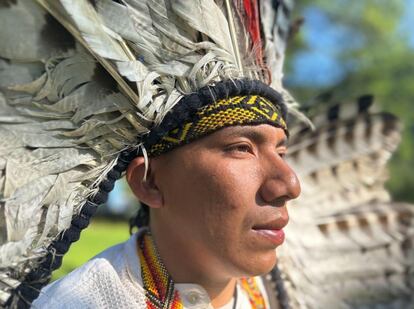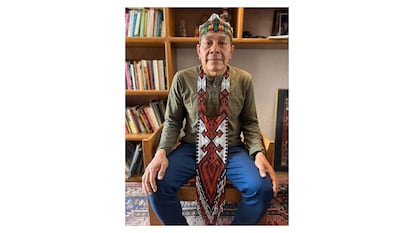From performing rituals in the deep Amazon to being accused over the largest seizure of ayahuasca in Mexican history
Ako Kamanawa is on trial over the discovery of 141 kilograms of the psychoactive concoction, considered a natural medicine for him and his community

He wears a feathered head dress, a white shirt, and a colorful beaded necklace covers his chest. Ako Kamanawa, an indigenous Noke Koi from the Brazilian Amazon, answers questions from the Mexican Prosecutor’s Office in a room for protected witnesses. His video statement is transmitted to a room where, in addition to the judge, lawyers, and translators, his two co-defendants in the case are present, Mexican citizens with whom he was arrested almost two years ago, on June 8, 2022, following the largest seizure of ayahuasca in the country’s history. It took place at Mexico City International airport, when authorities discovered that the 16 suitcases being carried by the three men contained 141 kilograms of this plant-based concoction with psychoactive effects.
“Where is your house, Ako?” prosecutor Kenia Maldonado Muñoz asks him at the beginning of the interrogation. A translator communicates the question in Portuguese to Itsomi Vari Isko, chieftain of the Noke Koi people, who has traveled to the Mexican capital to cooperate in the process. Itsomi Vari Isko, in turn, translates into Katukina, from the Pano linguistic family. Ako Kamanawa responds in his mother tongue, then the chief translates into Portuguese and the translator back into Spanish. And so, through this linguistic process, the 27-year-old is able to explain that he lives in a village in the Amazon jungle, in the State of Acre in Brazil; that his house is very simple, like all those in the jungle; that he cultivates the land, is a musician, and that he is one of the four payés, or shamans, in the village.
“The payé is chosen by the spirit of the snake, which is incorporated and becomes part of that person. He is a traditional doctor who takes care of the people in the village and performs treatments in the community,” says Ako Kamanawa in his mother tongue.
One of his working tools is ayahuasca, which he refers to as “the medicine,” and is made from at least two plants native to the Amazon (Banisteriopsis caapi and Psychotria Viridis). It has accompanied dozens of indigenous peoples living in the jungle for hundreds of years. Its use is permitted in Brazil for religious purposes and in Peru ceremonies associated with the drink are recognized as intangible cultural heritage.
In Mexico, however, there is a legal vacuum. Neither ayahuasca nor the two plants that compose it are listed as restricted substances, unlike with other plant species or the fungi kingdom, such as is the case with coca leaves or psilocybin mushrooms. In only a few countries has ayahuasca been expressly controlled, for example in France or Russia. But one of the active compounds in the mixture is DMT (N,N-dimethyltryptamine), an alkaloid that is controlled under the 1971 United Nations Convention on Psychotropic Substances, to which Mexico is a signatory. However, the UN International Narcotics Control Board recognized in 2001 and 2010 that no plant or preparation containing DMT is included in the Convention. Several other species contain this substance, for example Mimosa tenuiflora or tepezcohuite, used in traditional Mexican medicine as an antiseptic and healing agent.
— Can you tell us how ayahuasca is taken? the prosecutor’s interrogation continues.
— There is a first moment of concentration; then comes the strength of the medicine and, through it, the shama plays the music and the payé will reveal the illness or ailment that the person has and what kind of protection he needs.
Ako Kamanawa describes the ceremonies in his community: he says they are held every weekend and involve an average of 40 men and women of all ages. They are seen as an opportunity to purify and heal the body, but also to generate and share joy. As a payé, he is empowered to serve medicine; he also sings and plays the guitar along with the rest of the musicians. “Some songs are to cheer people up, others to chase away evil spirits and others for healing. Each song has a meaning,” he says.
In this hearing, held on April 12, 2024, Ako Kamanawa explains his version of events prior to his arrest. He says that Saúl, one of the two co-accused, came as a visitor to his village with the intention of learning about the traditions and medicines of his people, as other foreigners often do. It was Saúl who invited him to Mexico on a couple of occasions to sing in ayahuasca ceremonies, and he accepted because of the need to support his family, since he is fatherless and has a young son. According to him, Saúl took care of all the expenses and logistics of the trips. He cannot read or write, nor can he make himself understood in Portuguese or Spanish.
Regarding his first trip to Mexico, which took place between February and June 2021, Ako Kamanawa says he sang in 24 ceremonies, organized and managed by Saúl, as well as having returned to the jungle in the company of the Mexican. On the second occasion, he says he left his village carrying only a backpack, met Saúl in a nearby village and they then continued together to the airport in Lima, where he met Alain, the second Mexican. He claims that it was there where he first saw the 16 suitcases, without knowing that some had been documented in his name, and that he only became aware of their contents when they were opened by the Mexican authorities.
Ako Kamanawa spent nearly a year in jail after being bound by a judge to the criminal proceedings without access to an interpreter or consular representation. This violation of his fundamental rights allowed his defense to file and win an injunction to get him out of prison. One of his two lawyers, Alfonso José Jiménez, says they are confident that the Mexican Attorney General’s Office will act with an “inter-cultural perspective,” as it did in the cases of at least three South American indigenous healers imprisoned in 2022 for traveling with ayahuasca, who were finally released. In the meantime, Ako Kamanawa lives in Mexico City on bail, hoping to be able to return home.

Medicine in the lungs of the world
Chief Itsomi Vari Isko, Ako Kamanawa’s translator, told EL PAÍS that the Noke Koi people live in “the lungs of the world,” in the extreme west of Brazil, that there are 830 people distributed in 11 villages, and that life in the jungle is full of difficulties: “We no longer have anything to fish or hunt, so people like Ako go out in search of resources to support their families.”
In these communities, ayahuasca ceremonies — which they call uní — are held frequently, and this has been the case, according to the Indigenous leader, since the first generation of their ancestors: “God gave us these medicines because we have no laboratories, no pharmacies, no hospitals. Before the foundation of Brazil, we already used ayahuasca, it is still being used and will continue to be used. It is a tool that keeps our culture alive”.
Of Ako Kamanawa, whom he has known since he was born, he says that he is a young man with no schooling, who from a very young age decided to dedicate himself to the practice of traditional medicine. “The person who invited him to Mexico bought large quantities of medicine, which was not from Brazil or our people, but from Peru. Ako did not know what was in the suitcases and was imprisoned. He is here because of other people who made a mistake. Even so, Ako does not lower his head and will not give up because God placed him on the sacred path of medicine,” says Noke Koi.
The Brazilian government liberalized the use of ayahuasca in 2010, during Luiz Inácio Lula da Silva’s first term, with the condition that it be limited to religious rituals. The decision was made based on the report of a commission that, in line with multiple scientific studies, defended the therapeutic potential of ayahuasca to treat various mental disorders, as long as it is used in appropriate contexts.
Chief Itsomi Vari Isko had already defended his medicine in the Mexican Senate. It was January 2023, when he traveled from his village to support Ako Kamanawa in the criminal process. His stay coincided with the celebration of the Intercultural Forum of Enteogenic Medicine, organized in the upper chamber, where he was invited to say a few words: “Our medicine is not a drug: it really helps many people who need health and who come to our community from different continents to receive cures from the payés.”
Sitting next to the then-Senator Xóchitl Gálvez, today a candidate for the presidency of Mexico, the chief shared his concern for the growing consumption of alcohol among indigenous peoples: “It is very difficult to see that what does good is forbidden and what does bad is allowed. Our medicine does not produce dead people, nor sick people, nor criminals.”
Despite having spent a year in prison and another on bail, far from his village, Ako Kamanawa says he is happy and grateful to “the spirit” and to all the people who have helped him in Mexico. Chief Itsomi confirms this: “He is responding to justice and is happy, eager to return to Brazil to continue his work in the jungle, organizing ceremonies, bringing joy to the people.”
Sign up for our weekly newsletter to get more English-language news coverage from EL PAÍS USA Edition
Tu suscripción se está usando en otro dispositivo
¿Quieres añadir otro usuario a tu suscripción?
Si continúas leyendo en este dispositivo, no se podrá leer en el otro.
FlechaTu suscripción se está usando en otro dispositivo y solo puedes acceder a EL PAÍS desde un dispositivo a la vez.
Si quieres compartir tu cuenta, cambia tu suscripción a la modalidad Premium, así podrás añadir otro usuario. Cada uno accederá con su propia cuenta de email, lo que os permitirá personalizar vuestra experiencia en EL PAÍS.
¿Tienes una suscripción de empresa? Accede aquí para contratar más cuentas.
En el caso de no saber quién está usando tu cuenta, te recomendamos cambiar tu contraseña aquí.
Si decides continuar compartiendo tu cuenta, este mensaje se mostrará en tu dispositivo y en el de la otra persona que está usando tu cuenta de forma indefinida, afectando a tu experiencia de lectura. Puedes consultar aquí los términos y condiciones de la suscripción digital.








































